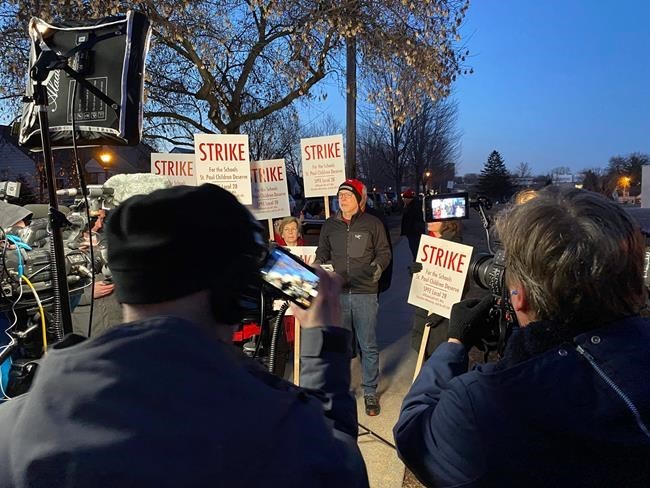
Nick Faber, president of the St. Paul Federation of Educators, speaks at a news conference early Tuesday, March 10, 2020, in St. Paul, Minn. Teachers at St. Paul Public Schools went on strike Tuesday after last-minute efforts to reach a contract agreement failed. (David Joles/Star Tribune via AP)
Republished March 10, 2020 - 1:27 PM
Original Publication Date March 10, 2020 - 3:16 AM
MINNEAPOLIS - Teachers in St. Paul went on strike Tuesday, cancelling classes indefinitely for the district's roughly 36,000 students, after overnight contract negotiations ended without an agreement on issues including mental health and bilingual support for students.
Union members hoisted strike signs and picketed outside public schools early Tuesday, then gathered for an afternoon rally and march to the St. Paul Public Schools district offices. The walkout was the first for the district since 1946, and left some parents scrambling to find alternative child care.
The school district and the St. Paul Federation of Educators, which represents about 3,550 teachers and support staff, negotiated for six straight days and, despite a mediation session that lasted until 3 a.m. Tuesday, were unable to come to terms.
Superintendent Joe Gothard said the district did everything it could to avoid a walkout.
The strike “disappoints me greatly. ... Students are not in their classrooms and our staff are not in our schools doing the work that they love,” Gothard said.
The union's priorities include hiring more mental health professionals, multilingual staffers, special education teachers and restorative practices specialists. The district has said creating mental health teams at every school would cost $27 million a year.
Union spokeswoman Megan Boldt said the request represents less than 4% of the district's budget. As of Tuesday morning, the district and union were still about $20 million apart, she said.
"We wanted to settle this contract and be in school with our students Tuesday morning,” said Nick Faber, president of the Saint Paul Federation of Educators. “Unfortunately, after more than nine months and marathon bargaining over the weekend, district leaders weren’t willing to move on the issues educators and parents know will help students thrive and break down racial barriers in our schools.”
Gothard said students need and deserve additional support, but that resources are limited and spending must be prioritized.
Corrin Murphy, a former classroom teacher who now coaches other teachers at Four Seasons A+ Elementary School, said she feels bad that students, including her own child, were not in school. But she also felt teachers had to stand up for students' needs.
She said mental health support is needed in all schools to help teachers deal with behavioural issues. Bilingual support and special education needs are also priorities. Murphy, who speaks Spanish, said she has been tasked with translating even though she isn't proficient.
And last week, she said, a fifth-grade girl was in an argument with another student when she lost control and couldn't calm herself. She ended up injuring four staff members, Murphy said, and disrupted an hour of learning for the entire class.
“There was no social worker available. A counsellor wasn't available. We just had to kind of figure out what to do with this student. And with us not having training, that’s when we got hurt,” Murphy said. “It's happening more and more often."
She said teachers are doing their best to love, comfort and create a safe space for students, but what works to solve a problem one day might not work the next.
“Teachers are just doing a little bit of whack-a-mole every single day," she said.
The concerns St. Paul teachers are raising are reflected in schools across the state and country, especially in high-poverty school districts where shortages of support staff leave educators feeling stretched.
After an 11-day strike last fall, the Chicago Teachers Union reached a contract that guaranteed nurses and social workers would be assigned to every school. Chicago Public Schools committed to hiring an additional 250 nurses and 209 more social workers by 2023 and put $500,000 toward recruiting and training people for those jobs and other roles.
Unions and professional groups for such employees say those jobs often are lower priorities when budgets are tight, but that their absence can have profound effects on student learning and teachers’ work.
Minnesota school districts get about two-thirds of their revenues from the state. The state's current two-year budget includes $543 million in new funding for education through grade 12, including $388 million in new money under the per-pupil formula, the state's biggest source of funding for schools.
The basic per-pupil general education formula has been rising 2% annually since 2015 to $6,567 for the fiscal year ending June 30, 2021. But it rose less than that — or not at all — in the years following the recession. School funding declines in other states due to the recession have fueled strikes nationwide.
Democratic Gov. Tim Walz, the father of a 7th grader in the district, said state mediators are ready to help when the two sides decide to return to negotiations.
“I encourage folks to continue to negotiate in good faith, get back in there to make sure that we have the resources necessary, the teachers necessary and the budget necessary to deliver that world class education,” said Walz, a former high school teacher.
Walz avoided taking sides, but expressed sympathy for one of the teachers’ main demands.
“Our students are telling us there’s not enough support on mental health issues,” he said.
___
Associated Press writer Steve Karnowski in St. Paul, Minnesota, contributed to this report.
News from © The Associated Press, 2020